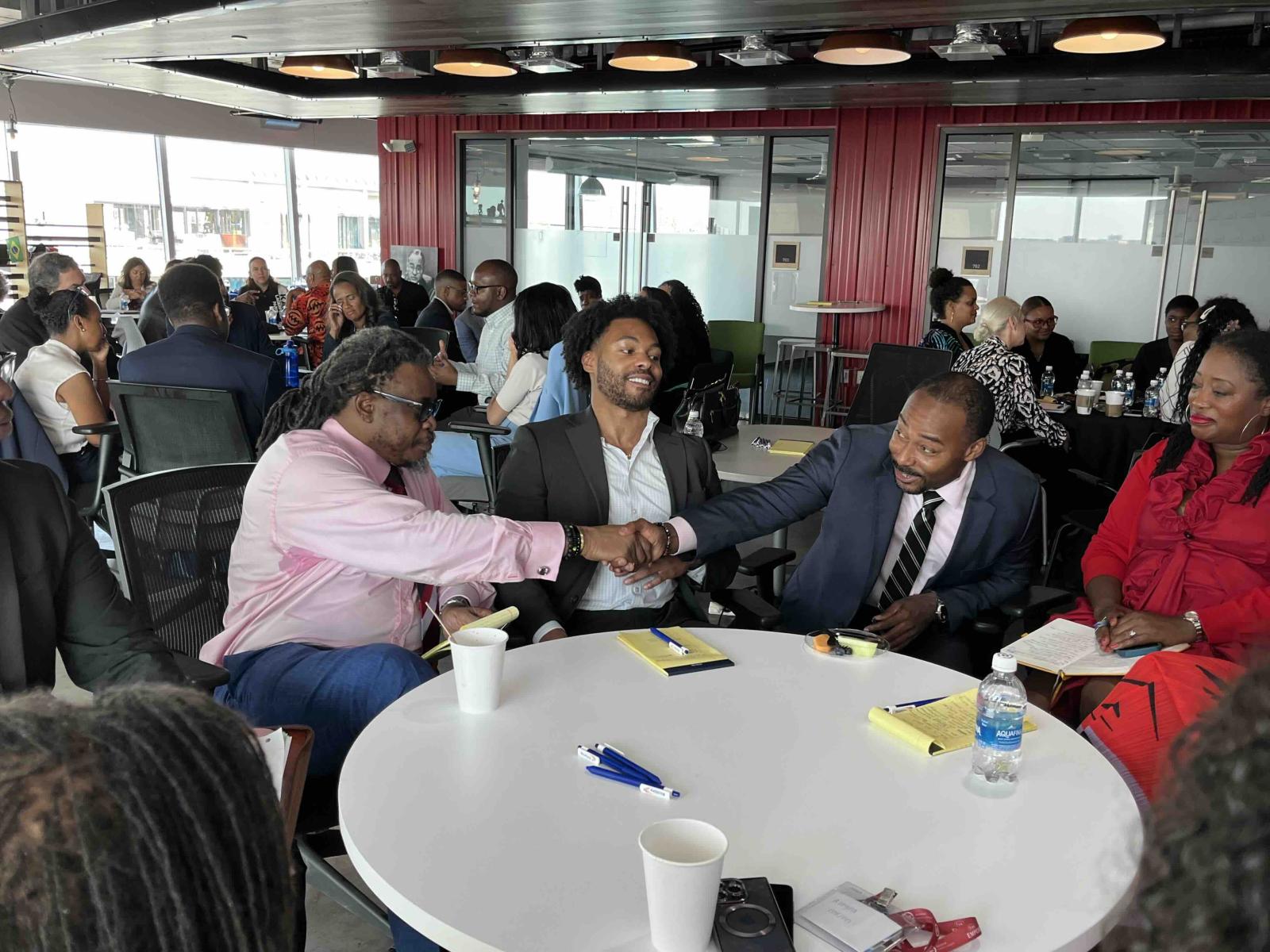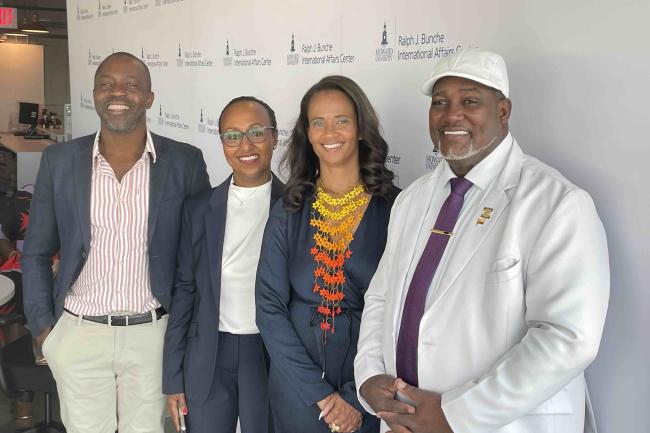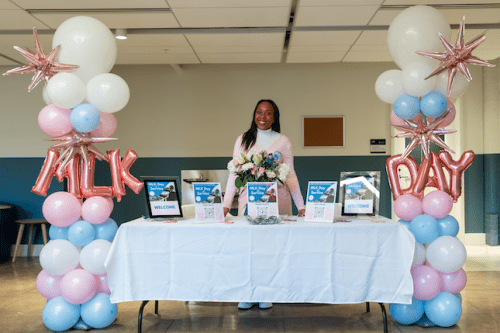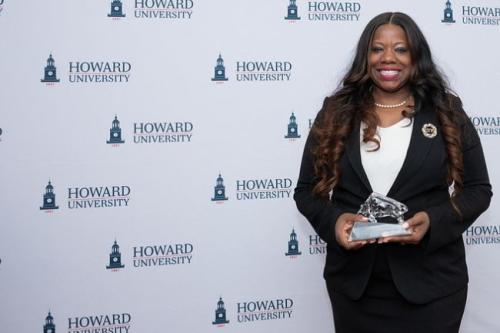WASHINGTON — In an effort to address the growing challenges of global anti-Black racism and its intersection with democratic erosion, the Ralph J. Bunche International Affairs Center at Howard University hosted a pivotal workshop, "Global Black Resistance: A Strategy Session to Develop Coordinated Responses," on the margins of the Congressional Black Caucus Annual Legislative Conference.
The event drew dozens of participants from around the world. Attendees included Black legislators, academics, Howard students, Black legislators, and civil society leaders from countries such as Brazil, Colombia, Canada, Germany, and the Netherlands.
“This is not just a U.S. conversation,” said Tonija M. Hope, Ph.D., director of the Ralph J. Bunche International Affairs Center. “We have participants from many parts of the world. The goal is to identify challenges on a global level and develop recommendations and solutions that can be implemented worldwide. It’s also an opportunity to forge global connections.”

The session was convened to address the pressing need for unified global strategies to combat anti-Black racism, especially in light of rising far-right authoritarianism and democratic backsliding. The session started off with a "vibe check" at the outset, setting the tone for an open and collaborative environment. The interactive workshop featured a mix of large group discussions and small group dialogue, with participants exploring how anti-Blackness manifests differently across various regions and considering collaborative solutions.
Racism is not unique to any one country. The transatlantic African slave trade and the societal infrastructure erected to keep Blacks in submission continue to affect lives, even though slavery has been outlawed in most countries for decades. Often, slavery was simply replaced with systems designed to keep Blacks from obtaining economic, political, or social power and to give others an inequitable advantage in wealth acquisition and status.
In many nations where Blacks are a racial minority, voter participation by citizens of African descent is seen as a threat to the traditional power structure. Especially in countries where they live in a disproportionate share of socio-economically marginalized communities, the voting interests of Blacks are often out of sync with the status quo. As Blacks use their votes to demand a greater share of the nation’s prosperity, those who have historically benefited from unequal representation in the halls of power have put in place voter suppression policies to try to mitigate the impact of Black voters. In some countries, subtle changes to voting laws make it more difficult to cast a ballot, while in other countries the obstacles are more overt and hostile.
Voting rights for Blacks in the United States was a core component of the Civil Rights Movement. However, the recent dismantling of the Voting Rights Act by the U.S. Supreme Court and legislation in several states has resulted in the elimination of many protections for voters. Though the fight for Black voting rights in the U.S. may be the most prominent example, with the possible and notable exception of the fight against apartheid in South Africa, the issue is by no means limited to a few countries. It is a problem that spans the African diaspora.
Awet Tesfaiesus, the first and only Black female member of the Bundestag, Germany's federal parliament, noted the importance of such international solidarity. She has been active in addressing topics such as racial discrimination, social inequality, and political representation.
“The rise of right-wing parties in Europe has put us under significant pressure. Events like this are crucial for building networks and supporting each other across borders,” Tesfaiesus said.
Cristóbal Caicedo Ángel, an Afro-Colombian member of congress, said the event was a valuable way of creating a sense of community among people from various parts of the world and different linguistic backgrounds.
"The discussions we've had on shared challenges will help us advance our collective efforts and address the issues we face in our respective regions,” Ángel said. “I'm leaving here feeling very hopeful and optimistic. It's crucial that we continue to build on this unity and work together for the benefit of the Afro-descendant community worldwide."
Clarence L. Lusane, Ph.D., a Howard University political science professor and director of the international relations major program, emphasized the significance of the workshop.
“Events like this are essential for addressing common issues across the diaspora,” Lusane said. “We need more opportunities to discuss our shared challenges and build ongoing communication to tackle racism and authoritarianism effectively.”
Malik Ngugi, a senior at Howard University majoring in political science and Spanish, reflected on the importance of the workshop for students and the broader global community.
“For us, as students in a globalized world, it’s vital to engage in discussions like these,” Ngugi said. “What happens in the U.S. resonates with Latin America and Europe. Understanding our shared issues helps us address them more effectively.”
The session concluded with a commitment to continue the dialogue and implement collaborative strategies. Participants expressed a strong desire for future convenings to build on the connections made and advance the collective goals of combating anti-Black racism and strengthening democratic institutions.
The event was co-sponsored by the Charles F. Kettering Foundation, the Open Society Foundation, the Institute for Race, Equality & Human Rights and the Thurgood Marshall Civil Rights Center at Howard University School of Law.
For more information on future events and initiatives, please visit www.global.howard.edu
Pictured (top of the page): Colombian lawmaker Gerson Montaño; German lawmaker Awet Tesfaiesus; Tonija M. Hope, director of the Ralph J. Bunche International Affairs Center; and Cristóbal Caicedo Ángel, also a lawmaker from Colombia.
###





